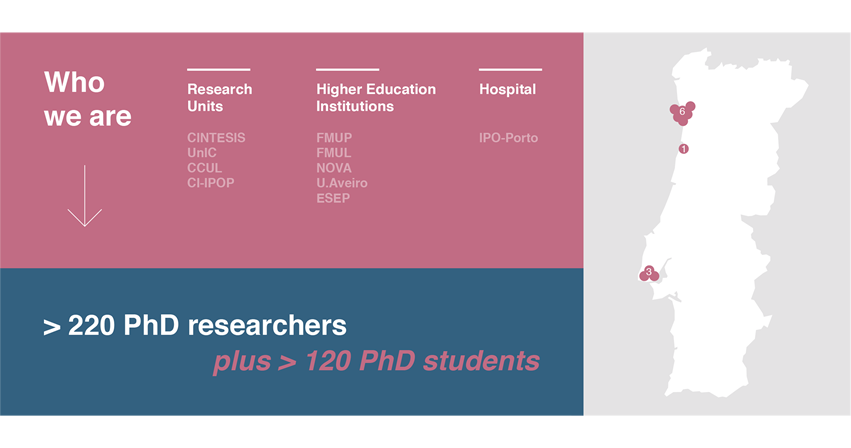Our Mission
About us...
To strengthen Health Research, from the preclinical and clinical stages to the community level, by connecting universities to healthcare providers, in the scope of the Portuguese policy for Science and Technology.
Our goal
To be a major player and catalyst in changing the landscape of clinical, translational and community research in Portugal.

RISE Scientific Structure
RISE is based on 5 interrelated Thematic Lines (TL). The first three TLs (TL1-TL3) focuses on preclinical, clinical and translational research on a wide range of relevant diseases, articulating with the remaining two TLs (TL4 and TL5), which focuses their research on how to improve healthcare and how to address important health societal challenges incorporating the most adequate scientific evidence:
TL1 – Clinical and Translational Research in Cardiovascular Sciences
TL2 – Clinical and Translational Research in Oncology
TL3 –Clinical and Translational Research in Inflammatory and Degenerative Diseases
TL4 – Healthcare Policy, Technology and Digital Transformation

Support and monitoring of public policy
RISE is set to support public policy through:
- Identification and introduction of critical problems onto the political agenda in the fields of health and healthcare;
- Generation of evidence and information;
- Provision of a robust infrastructure to monitor and evaluate implemented policies;
- Proposal of alternative solutions for identified problems.

Institutional organization and governance model
RISE is hosted at FMUP, with 6 local management poles at 5 universities (UPorto, ULisboa, UAveiro, NOVA, UAlgarve, UMadeira), 1 polytechnic school (Nursing School of Porto – ESEP), and one healthcare institution (Instituto Português de Oncologia do Porto – IPO-Porto).
RISE relies on a well-structured Governance Model designed to ensure effectiveness in pursuing its scientific, technological and third-mission goals while supporting its strategy for scientific careers development and for international promotion and attraction of international funding.

Research Units
CINTESIS
CINTESIS is an important Research & Development Unit (R&D) whose mission is to find answers and solutions, in the short term, to relevant health problems, without ever losing sight of the cost-benefit ratio.
Hosted at the University of Porto, CINTESIS has a multicenter, decentralized and flexible nature grounded in 46 partner institutions (29 Higher Education institutions, 12 hospitals/health institutions and 5 health companies) and 8 Higher Education institutions acting as hubs, namely University of Porto, Nova University of Lisbon, University of Aveiro, University of Algarve, University of Madeira and Nursing School of Porto.
Altogether, the Center aggregates over 500 researchers in 24 research groups, working in 3 main thematic lines: Preventive Health and Societal Challenges (TL1), Clinical and Translational Research (TL2), and Health Data and Decision Sciences & Information Technologies (TL3).
UnIC
UnIC is a major Centre in Portugal devoted to the translational approach of cardiovascular (CV) diseases, that currently represent a major burden in aged western societies.
Assembling investigators from Faculty of Medicine of University of Porto and from Centro Hospitalar de São João, EPE (CHSJ), among others, this Unit is in the frontline regarding scientific productivity, training and implementing innovative therapeutic approaches.
The combination of different basic science and clinical departments allows the implementation of bench to bedside to bench approaches in the study of cardiovascular (CV) diseases, with a significant number of its investigators combining research with clinical activity.
CCUL
CCUL aims to contribute for an improvement in the understanding of the cardiovascular system (CV) in health and disease through interdisciplinary research, to translate this knowledge into clinical practice in order to improve patient’s outcome, care and quality of life and to develop a more robust organization, which is able to produce innovative research, and promote leadership in the training of the next generation of CV scientists, clinicians and allied health professionals.
This Center is also committed to engage with the public, to offer services to patients, to be a source of advice for patient organizations and policy makers.
Its strategy is to build in Portugal a tangible, mature and effective translational research platform on CV sciences based on outstanding clinical and basic science pillars and fully integrated into the FMUL wider research strategy and the national health service activities.
CI-IPOP
CI-IPOP is the research branch of the Portuguese Oncology Institute of Porto (IPO Porto), having as main objective to understand the pathobiological mechanisms of cancer that may enable prevention, early diagnosis, correct evaluation of the prognosis and the development of more effective therapies.
Currently, the Research Centre hosts 116 researchers, of whom about half are human resources from the IPO Porto, and includes 7 research groups working on translational cancer research, five of which have a high-intensity laboratory level and two created to meet the growing needs on epidemiology of cancer, patient outcome and quality of life, as well as value-based healthcare and sustainability.
CI-IPOP also hosts the Clinical Research Unit (which has Early Phase Clinical Trial division) and several clinical staff that publishes on a regular basis, which are not affiliated with any of the aforementioned research groups.





